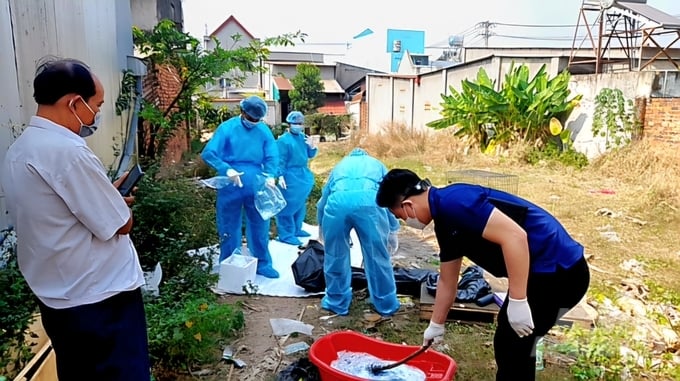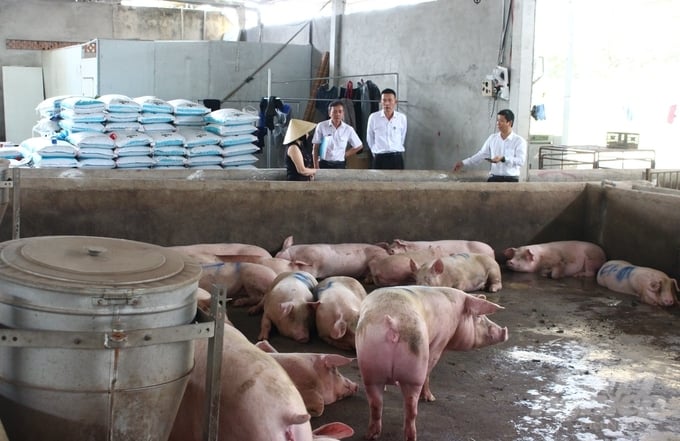May 21, 2025 | 00:57 GMT +7
May 21, 2025 | 00:57 GMT +7
Hotline: 0913.378.918
May 21, 2025 | 00:57 GMT +7
Hotline: 0913.378.918

No new disease outbreaks among livestock or poultry have been reported in Dong Nai province since the beginning of 2024. Photo: Minh Sang.
According to the official dispatch, the illegal transportation and trading of poultry and poultry products into Vietnam through the borders have increased in complexity, with a considerable amount of poultry smuggled into Vietnam on a daily basis.
Rampant illegal activities have introduced various strains of the avian influenza virus and other dangerous infectious diseases into Vietnam, resulting in outbreaks, significant damages to the poultry production sector and public health, and societal concerns. Additionally, they have a significant impact on the investment environment for domestic livestock development.
In response to these issues, the Ministry of Agriculture and Rural Development requested the Dong Nai Provincial People's Committee to immediately direct relevant agencies across all levels to focus on implementing coordinated solutions in compliance with the Law on Animal Health.
Following the directives of the Ministry of Agriculture and Rural Development and local governments, Dong Nai province's livestock production and animal health sector has proactively implemented disease prevention and control measures. Furthermore, efforts have been made to establish and maintain safe livestock production zones, which are managed by the local governments.
As a capital of livestock production, Dong Nai province faces significant disease pressure due to its high production density and numerous critical transportation routes within the region. However, proactive and effective disease prevention and control measures have enabled the province's local governments to maintain a strong development of the livestock production sector.
According to the Dong Nai province's Sub-Department of Livestock Production and Animal Health, the province has identified 7 out of 14 districts and cities as areas at low risk of avian influenza outbreak, and 4 districts at high risk. However, avian influenza outbreaks in high-risk areas have been controlled.
Furthermore, no new disease outbreaks have been reported in the aforementioned areas since 2023. Additionally, local governments have prioritized their vaccination efforts. Dong Nai province aims to maintain at least five safe disease zones at the district level.

Strengthening efforts in disease prevention and control across the entire province. Photo: TG.
Mr. Le Van Tho, owner of an industrial poultry farm in Long Duc commune, Long Thanh district, emphasized the indispensable role of proactive prevention and effective vaccination against infectious diseases. Additionally, the construction of closed-loop cold farms contributes significantly to ensuring biosecurity.
Automated feeding systems minimize the contact between livestock and the external environment and humans, thereby limiting the transmission of diseases. Strict control measures during farming operations are necessary to prevent the entry of flies and mosquitoes, which are primary carriers of pathogens, into the farms.
According to several poultry farm owners in Vinh Cuu district, local production is challenged by the low prices of livestock products, which are further aggravated by the high costs of feed. However, a number of small-scale local farmers have demonstrated interest in implementing biological bedding and processing livestock waste into organic fertilizers for crops in a closed-loop agricultural system.
Mr. Nguyen Xuan Hung from Tan An commune, Vinh Cuu district, revealed, "Our family is gradually transitioning to organic farming practices. Firstly, we prioritize standardizing the vaccination procedures. We also actively implement disease prevention measures over treatment, resulting in healthier poultry, reduced disease-related losses, and higher-quality eggs and meat, which are then sold in the market at premium prices."
According to the Dong Nai province's Sub-Department of Livestock Production and Animal Health, over 90% of the livestock production in Dong Nai province occurs on a farm-scale. The majority of local businesses and farms comply with biosecure farming practices and disease management requirements.
Virus surveillance facilitates early disease detection, proactive prevention, and serves as a scientific basis for proposing vaccination campaigns in high-risk areas. Accordingly, vaccination programs have been deployed throughout the province with remarkable success.
Effective prevention, control, and containment measures have been implemented in areas with disease outbreaks to prevent their spread on a wider scale.

The majority of businesses and farms in Dong Nai province comply with biosecure farming practices and disease management requirements. Photo: Minh Sang.
Mr. Nguyen Truong Giang, General Director of the Dong Nai province's Sub-Department of Livestock Production and Animal Health, stated, "Following directives from the Ministry of Agriculture and Rural Development, our livestock production and animal health sectors have provided specific instructions to inspection stations and quarantine offices throughout the province to verify information and review slaughter sites for urgent correction.
The Sub-Department has also directed relevant agencies to strengthen their efforts in disease prevention and control, in addition to ensuring strict compliance with regulations for import and export activities. Notably, misconducts will be reported to the authorities for coordinated responses. The Sub-Department will strengthen inter-agency inspections and crackdowns on unauthorized slaughterhouses."
According to Mr. Giang, the province's control of livestock disease has remained relatively stable since the beginning of 2024, with no new outbreaks reported. Furthermore, closed-loop biosecure farming practices have reduced disease-related losses in livestock production. This approach has been prioritized by businesses and farm owners to lower production costs and foster sustainable development.
On the other hand, according to the Chairman of the Dong Nai Livestock Association, the widespread import of cheap meat and the expansion of frozen meat outlets pose significant risks of disease transmission. Consequently, relevant agencies must maintain effective control over production safety and hygiene.
Moreover, strict control of illegal slaughtering contributes significantly to preventing disease outbreaks and ensuring food safety. As a result, these issues must be promptly addressed to promote sustainable development of the livestock production sector.
Translated by Nguyen Hai Long

(VAN) Japan's grant aid project contributes to capacity building, promoting organic agricultural production, and fostering sustainable community development in Dong Thap province.

(VAN) For years, the CRISPR-Cas9 genome technology has been reshaping genetic engineering, a precision tool to transform everything from agriculture to medicine.

(VAN) Vietnam aims to become a 'leader' in the region in the capacity and managing effectively soil health and crop nutrition.
![Reducing emissions from rice fields: [Part 1] Farming clean rice together](https://t.ex-cdn.com/nongnghiepmoitruong.vn/608w/files/news/2025/05/05/z6509661417740_a647202949c539012a959e841c03e1d3-nongnghiep-143611.jpg)
(VAN) Growing clean rice helps reduce environmental pollution while increasing income, allowing farmers to feel secure in production and remain committed to their fields for the long term.
/2025/05/19/5136-1-144800_230.jpg)
(VAN) The Nghe An Provincial People's Committee has just approved the list of beneficiaries eligible for revenue from the Emission Reductions Payment Agreement (ERPA) in the North Central region for the year 2025.

(VAN) 14 out of 35 domesticated elephants in Dak Lak province have had their living conditions improved, with 11 of them currently participating in the non-riding elephant tourism model.

(VAN) Muong Nhe Nature Reserve hopes that being upgraded to a national park will lay the foundation for forest protection efforts to be carried out in a systematic, modern, and sustainable manner.